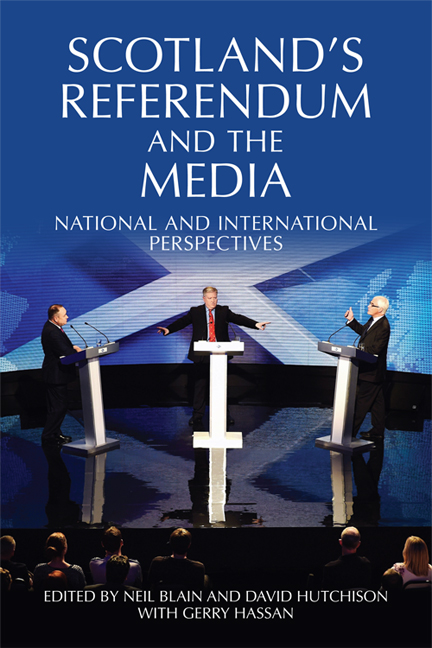Book contents
- Frontmatter
- Contents
- Preface
- Part One The Referendum in Scotland
- Part Two Views from the UK
- Part Three International Perspectives
- 13 ‘Knock-on Consequences’: Irish Media Coverage of the Scottish Referendum
- 14 Spain, Catalonia and the Scottish Referendum: A Study in Multiple Realities
- 15 The French View
- 16 The Scottish Referendum in Austrian, German and Swiss Media
- 17 The Scottish Referendum: The View from Quebec
- 18 The Scotland Referendum in the English-language Canadian Media
- 19 Australia and the Scottish Independence Referendum
- 20 Afterword: Reimagining Scotland in a New Political Landscape
- Notes on the Contributors
- Index
19 - Australia and the Scottish Independence Referendum
from Part Three - International Perspectives
Published online by Cambridge University Press: 05 August 2016
- Frontmatter
- Contents
- Preface
- Part One The Referendum in Scotland
- Part Two Views from the UK
- Part Three International Perspectives
- 13 ‘Knock-on Consequences’: Irish Media Coverage of the Scottish Referendum
- 14 Spain, Catalonia and the Scottish Referendum: A Study in Multiple Realities
- 15 The French View
- 16 The Scottish Referendum in Austrian, German and Swiss Media
- 17 The Scottish Referendum: The View from Quebec
- 18 The Scotland Referendum in the English-language Canadian Media
- 19 Australia and the Scottish Independence Referendum
- 20 Afterword: Reimagining Scotland in a New Political Landscape
- Notes on the Contributors
- Index
Summary
Introduction
Australia is one of the countries where the Scottish independence campaign had the greatest resonance. Scots, or the descendants of Scots, comprise more than 1.9 million of the Australian population, or 8.9 per cent of the total. This author currently lives and works in Brisbane, where there is a suburb called Kelvin Grove, and streets with obviously Scottish names such as Dunsmore, Clyde and Moy. Across the country, from Perth on the west coast to Mackay in tropical northern Queensland, the evidence of Scottish influence abounds. Famous Australian Scots include Angus and Malcolm Young of iconic rock band AC/DC, the opera singer Joan Sutherland, and a successful newspaper proprietor by the name of Rupert Murdoch.
Having been colonised and shaped by Scots among other nationalities who migrated there from the United Kingdom in the late eighteenth century, whether voluntarily or on penal ships, on 1 January 1901 Australia, with a population of around 4 million, gained its independence from the mother country and was established as a federation – the Commonwealth of Australia – with six states (and later, two territories: the sparsely populated Northern Territory, and the Australian Capital Territory, where Canberra and the seat of government are located). The British monarch remained as Australia's head of state (and still holds that position), but henceforth the country would run its own affairs without the interference of a colonial power. The ousting of Prime Minister Gough Whitlam by the Governor General in 1975 on a constitutional technicality cast some doubt on that status, and the issue of Australia's relationship to the UK remains contentious, though dormant for the time being. A referendum on whether Australia should ditch the British monarch and become a republic was held in 1999 (the vote went against), and from time to time calls for a further plebiscite arise in the Australian media.
Those Australians who oppose a republic tend to be the descendants of British immigrants, still a majority of the 22 million population, who feel a cultural connection with the UK and wish to retain it. Supporters of a republic draw on the increasingly multicultural, non-Anglo Saxon make-up of the population, who care little for the rituals of British or any other monarchy.
- Type
- Chapter
- Information
- Scotland's Referendum and the MediaNational and International Perspectives, pp. 217 - 227Publisher: Edinburgh University PressPrint publication year: 2016



